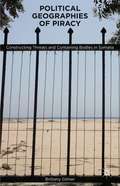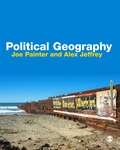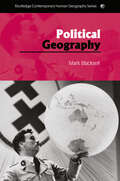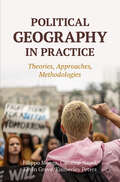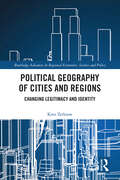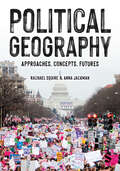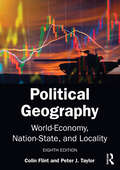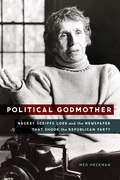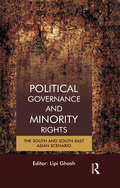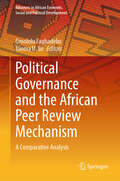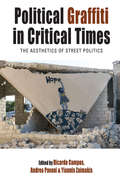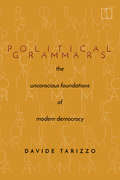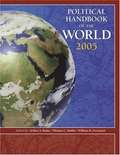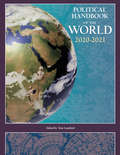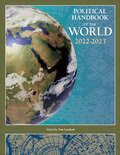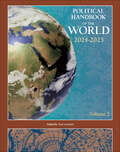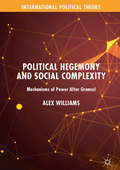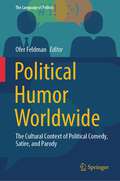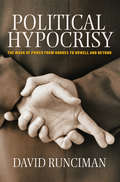- Table View
- List View
Political Geographies of Piracy
by Brittany GilmerPolitical Geographies of Piracy examines the new security-development framework for combating piracy off the coast of Somalia. It demonstrates how counter piracy actors, particularly in the development sector, are reworking territorial sovereignties and reproducing markets of security and development in Somalia. Underlying onshore counter piracy strategies is a desire to both simultaneously secure and develop Somalia. However, the wider goal of these security-development strategies is to prevent and contain particular racialized and gendered actions and bodies on shore in Somalia. Drawing upon unique insider knowledge of the international counter piracy regime, Gilmer reveals the institutional machinations at stake in efforts to simultaneously combat and profit from Somali piracy. Research conducted on the ground in Somalia, and with convicted piracy prisoners detained in the Seychelles, also provides a rare glimpse into how security-development strategies for combating piracy are being promoted and resisted among various Somali communities.
Political Geography
by Joe Painter Alex JeffreyRevised and updated, this is a new edition of a core undergraduate resource on Political Geography. Unique in the teaching literature, Political Geography (published originally as Politics, Geography, and 'Political Geography') retains its focus on the social and cultural, while systematically overviewing the entire discipline. The text explains: • Politics, geography, and "political" geography: power, resources, institutions, and the history of political geography • State formation: classical views as well as recent work on governance and governmentality • Welfare state to workfare state: the restructuring of present state strategies • Democracy citizenship, law: different models of democracy from Held to Mouffe; democracy citizenship, law in European and global context • Electoral geography • Identity and social movements: the relation between identity and political action • Nationalism and regionalism: ethnicity, national identity, "otherness" • Imperialism and post-colonialism: the theoretical literature from World Systems Theory to post-structuralist accounts • Geopolitics: the political, economic, and strategic significance of geography, illustrated with examples from recent world politics Comprehensive, accessible and illustrated with real world examples, Political Geography provides undergraduates with a thorough understanding of the relationship between geography and politics.
Political Geography (Routledge Contemporary Human Geography Series)
by Mark BlacksellIn 1904 Sir Halford Mackinder published his seminal paper The Geographical Pivot of History demonstrating the central position of political geography in the study of geography as a whole; a century later and political geography is still at the heart of human geography. Yet over time political geography has experienced many significant ups and downs, eventually recovering to a position of renewed pre-eminence as the last century drew to a close. This fascinating journey, charted by this equally fascinating book, forms a key part of the history of the evolution of spatial science. Beyond a narrative, the book provides an introduction to all the complex elements that constitute political geography today. Organized in three distinct sections, it covers: process and patterns ideology and geopolitical visions beyond the state. Tackling key contemporary issues (such as politics and the local state), as well as more traditional topics (such as state formation and international relations), this thought-provoking book covers the range of theoretical approaches. Including many original maps and diagrams which skilfully illustrate key themes, this book is a concise, student-friendly, pedagogically rich introduction for students of geography, political science and world affairs.
Political Geography in Practice: Theories, Approaches, Methodologies
by Kimberley Peters Caroline Nagel Kevin Grove Filippo MengaThis innovative textbook on the theories, approaches and methodologies that inform political geography is brought together by past and present editors of the journal of the same name. The book fills the current gap in the literature through a reflection on the ‘doing’ of political geography: its very practice. The book includes chapters authored by leading and emerging voices in the field and covers themes to guide students across various degree levels, as well as university staff and faculty, in a logical and practical manner. The textbook allows students to develop critical thinking and reflect on important aspects of the practice of the sub-discipline. It presents how theories, approaches and methodologies are adopted by researchers in practice, equipping political geographers at all stages to develop their own individual research projects. Download the SN More Media app for free, scan a link with play button and access audio directly on your smartphone or tablet.
Political Geography of Cities and Regions: Changing Legitimacy and Identity (Routledge Advances in Regional Economics, Science and Policy)
by Kees TerlouwThis monograph presents a novel typology of relational and territorial perspectives on legitimacy and identity. This typology is then applied to two different political and historical contexts, namely the trajectories of the Amsterdam metropolitan region in the Netherlands and the Ruhr metropolitan region in Germany. The historical discussion spans 500 years, providing valuable depth to the study. Taken as a whole, the book provides a new perspective within the territorial-relational dichotomy and the geographies of discontent debate. Its key insights are that identity and political legitimacy is embedded in history, and that both relational and territorial perspectives on these issues are time and place dependent. This book will be stimulating reading for advanced students, researchers and policymakers working in political geography, human geography, regional studies, and broader social and political sciences.
Political Geography: Approaches, Concepts, Futures
by Rachael Squire Anna JackmanThis innovative and thought-provoking text will teach you about the diverse and increasingly expansive sub-discipline of geopolitics. Divided into three sections, Political Geography draws on case studies from a diverse range of scales, contexts, and demographics, to introduce you to the key approaches, concepts, and futures of geopolitics. You will cover an extensive range of key topics in Political Geography, from feminist geopolitics to non-human worlds, and nationalism to peace and resistance. Throughout this first edition you will apply various theoretical lenses, utilise a wide range of examples both past and present, and draw on cutting edge scholarship to reinvigorate your understanding of important themes such as the state, borders, and territory. Based on the award-winning course at RHUL, Politcal Geography includes a variety of sites, spaces, materials, and images alongside ‘In the field’ tips, ideas for practical dissertation research, and tasks to facilitate active follow-on learning. Case studies, key terms, key questions and learning exercises, and annotated readings are included throughout every chapter to aid understanding and help you to engage and reflect on the content. Designed as a core text for undergraduates and an introductory text for postgraduates with an interest in Political Geography. Rachael Squire is lecturer in Human Geography at Royal Holloway University of London Anna Jackman is lecturer in Human Geography at University of Reading
Political Geography: Approaches, Concepts, Futures
by Rachael Squire Anna JackmanThis innovative and thought-provoking text will teach you about the diverse and increasingly expansive sub-discipline of geopolitics. Divided into three sections, Political Geography draws on case studies from a diverse range of scales, contexts, and demographics, to introduce you to the key approaches, concepts, and futures of geopolitics. You will cover an extensive range of key topics in Political Geography, from feminist geopolitics to non-human worlds, and nationalism to peace and resistance. Throughout this first edition you will apply various theoretical lenses, utilise a wide range of examples both past and present, and draw on cutting edge scholarship to reinvigorate your understanding of important themes such as the state, borders, and territory. Based on the award-winning course at RHUL, Politcal Geography includes a variety of sites, spaces, materials, and images alongside ‘In the field’ tips, ideas for practical dissertation research, and tasks to facilitate active follow-on learning. Case studies, key terms, key questions and learning exercises, and annotated readings are included throughout every chapter to aid understanding and help you to engage and reflect on the content. Designed as a core text for undergraduates and an introductory text for postgraduates with an interest in Political Geography. Rachael Squire is lecturer in Human Geography at Royal Holloway University of London Anna Jackman is lecturer in Human Geography at University of Reading
Political Geography: World-Economy, Nation-State, and Locality
by Colin Flint Peter J. TaylorThe new and updated eighth edition of Political Geography once again shows itself fit to tackle a frequently and rapidly changing geopolitical landscape. It retains the intellectual clarity, rigour, and vision of previous editions based upon its world-systems approach and is complemented by the perspective of feminist geography. The book successfully integrates the complexity of individuals with the complexity of the world-economy by merging the compatible, but different, research agendas of the co-authors.This edition explores political geography within the context of US–China competition, Russia’s war with Ukraine, global climate change, new technologies, and challenges to democracy. It advances the discussion from the previous editions on the dynamics of the capitalist world-economy and the constant tension between the global scale of economic processes and the territorialization of politics in the current context of geopolitical change. The chapters have been updated with new examples – new sections on global climate change, populism, and the growing threat of global war. The book offers a framework to help students make their own judgements of how we got where we are today, and what may or should be done about it.Political Geography remains a core text for students of political geography, geopolitics, international relations, and political science, as well as more broadly across human geography and the social sciences.
Political Godmother: Nackey Scripps Loeb and the Newspaper That Shook the Republican Party
by Meg HeckmanNewspaper publisher and GOP kingmaker Nackey Scripps Loeb headed the Union Leader Corporation, one of the most unusual—and influential—local newspaper companies in the United States. Her unapologetic conservatism and powerful perch in the home of the first-in-the-nation presidential primary elicited fear and respect while her leadership of New Hampshire&’s Union Leader gave her an outsized role in American politics. In Political Godmother Meg Heckman looks at Loeb&’s rough-and-tumble political life against the backdrop of the right-wing media landscape of the late twentieth century. Heckman reveals Loeb as a force of nature, more than willing to wield her tremendous clout and able to convince the likes of Pat Buchanan to challenge a sitting president. Although Loeb initially had no interest in the newspaper business, she eventually penned more than a thousand front-page editorials, drew political cartoons, and became a regular on C-SPAN. A fascinating look at power politics in action, Political Godmother reveals how one woman ignited conservatism&’s transformation of the contemporary Republican Party.
Political Governance and Minority Rights: The South and South-East Asian Scenario
by Lipi GhoshThis volume brings together a collection of essays analysing the current scenario in South and Southeast Asia with respect to the position of minority groups. Based on an in-depth investigation of some of the lasting minority–majority conflicts of the post-colonial period in countries that often escape comparison, the articles are a rich and critical exposition of the social, economic, cultural and political dimensions of these struggles. The central question being addressed is that of community rights in the modern nation-state and how these are being understood by the two concerned parties and, where and when, thereof, a situation of conflict arose.
Political Governance and the African Peer Review Mechanism: A Comparative Analysis (Advances in African Economic, Social and Political Development)
by Omololu Fagbadebo Isioma U. IleThis book presents a comparative analysis of political governance and includes case studies from various African countries. It further sheds light on the paradox of poverty despite Africa's plentiful resources and traces its roots in historical legacies of colonialism and leadership failures. The book examines the African Peer Review Mechanism (APRM) initiated by the African Union (AU) in 2003 and explores the APRM's role in promoting sustainable development, political stability, and integration. Against this background, the book dissects the four thematic areas of the APRM, with a focal point on democratic and political governance, illuminating challenges and proposing solutions. In case studies on selected African countries, contributors present governance structures, highlighting the struggle for accountability, representation, and public participation. The book highlights alarming indicators of weak governance, including corruption and declining public engagement, and reflects Africa's journey toward effective governance. By doing so, the book scrutinizes African governing systems' responses to crises and offers valuable insights into the continent's quest for progress and transformation.
Political Governance in Post-Genocide Rwanda
by Filip ReyntjensFilip Reyntjens's new book analyzes political governance in post-genocide Rwanda and focuses on the rise of the authoritarian Rwandan Patriotic Front (RPF). In the aftermath of the 1994 Rwandan genocide, the RPF has employed various means - rigged elections, elimination of opposition parties and civil society, legislation outlawing dissenting opinions, and terrorism - to consolidate power and perpetuate its position as the nation's ruling party. Although many international observers have hailed Rwanda as a 'success story' for its technocratic governance, societal reforms, and economic development, Reyntjens complicates this picture by casting light on the regime's human rights abuses, social engineering projects, information management schemes, and retributive justice system.
Political Graffiti in Critical Times: The Aesthetics of Street Politics (Protest, Culture & Society #28)
by Ricardo Campos, Andrea Pavoni Yiannis ZaimakisWhether aesthetically or politically inspired, graffiti is among the oldest forms of expression in human history, one that becomes especially significant during periods of social and political upheaval. With a particular focus on the demographic, ecological, and economic crises of today, this volume provides a wide-ranging exploration of urban space and visual protest. Assembling case studies that cover topics such as gentrification in Cyprus, the convulsions of post-independence East Timor, and opposition to Donald Trump in the American capital, it reveals the diverse ways in which street artists challenge existing social orders and reimagine urban landscapes.
Political Graffiti in Critical Times: The Aesthetics of Street Politics (Protest, Culture & Society #28)
by Ricardo Campos, Andrea Pavoni Yiannis ZaimakisWhether aesthetically or politically inspired, graffiti is among the oldest forms of expression in human history, one that becomes especially significant during periods of social and political upheaval. With a particular focus on the demographic, ecological, and economic crises of today, this volume provides a wide-ranging exploration of urban space and visual protest. Assembling case studies that cover topics such as gentrification in Cyprus, the convulsions of post-independence East Timor, and opposition to Donald Trump in the American capital, it reveals the diverse ways in which street artists challenge existing social orders and reimagine urban landscapes.
Political Grammars: The Unconscious Foundations of Modern Democracy (Square One: First-Order Questions in the Humanities)
by Davide TarizzoDo we need to be a "people," populus, in order to embrace democracy and live together in peace? If so, what is a populus? Is it by definition a nation? What exactly do we mean by nationality? In this book, Davide Tarizzo takes up the problem of modern democratic, liberal peoples—how to define them, how to explain their invariance over time, and how to differentiate one people from another. Specifically, Tarizzo proposes that Jacques Lacan's theory of the subject enables us to clearly distinguish between the notion of personal identity and the notion of subjectivity, and that this very distinction is critical to understanding the nature of nations whose sense of nationhood does not rest on any self-evident identity or pre-existent cultural or ethnic homogeneity between individuals. Developing an argument about the birth and rise of modern peoples that draws on the American Declaration of Independence of 1776 and the French Declaration of the Rights of Man and the Citizen of 1789 as examples, Tarizzo introduces the concept of "political grammar"—a phrase that denotes the conditions of political subjectification that enable the enunciation of an emergent "we." Democracy, Tarizzo argues, flourishes when the opening between subjectivity and identity is maintained. And in fact, as he compellingly demonstrates, depending on the political grammar at work, democracy can be productively perceived as a process of never-ending recovery from a lack of clear national identity.
Political Handbook of the World 2005-2006
by Arthur S. Banks Thomas C. Muller William R. OverstreetFor almost eighty years, researchers seeking governmental and political information on countries around the globe have turned to Political Handbook of the World for the most authoritative and complete presentation of facts and analysis. CQ Press welcomes this renowned publication to its list of acclaimed reference sources, bringing its many current devotees - and future users - a new edition for 2005-2006, with a commitment to continuing the editorial integrity that has become the hallmark of this resource since its initial publication in 1928.
Political Handbook of the World 2020-2021 (Political Handbook of the World)
by Tom LansfordThe Political Handbook of the World by Tom Lansford provides timely, thorough, and accurate political information, with more in-depth coverage of current political controversies than any other reference guide. The updated 2020-2021 edition will continue to be the most authoritative source for finding complete facts and analysis on each country′s governmental and political makeup. Compiling in one place more than 200 entries on countries and territories throughout the world, this volume is renowned for its extensive coverage of all major and minor political parties and groups in each political system. The Political Handbook of the World 2020-2021 also provides names of key ambassadors and international memberships of each country, plus detailed profiles of more than 30 intergovernmental organizations and UN agencies. And this update will aim to include coverage of current events, issues, crises, and controversies from the course of the last two years.
Political Handbook of the World 2020-2021 (Political Handbook of the World)
by Tom LansfordThe Political Handbook of the World by Tom Lansford provides timely, thorough, and accurate political information, with more in-depth coverage of current political controversies than any other reference guide. The updated 2020-2021 edition will continue to be the most authoritative source for finding complete facts and analysis on each country′s governmental and political makeup. Compiling in one place more than 200 entries on countries and territories throughout the world, this volume is renowned for its extensive coverage of all major and minor political parties and groups in each political system. The Political Handbook of the World 2020-2021 also provides names of key ambassadors and international memberships of each country, plus detailed profiles of more than 30 intergovernmental organizations and UN agencies. And this update will aim to include coverage of current events, issues, crises, and controversies from the course of the last two years.
Political Handbook of the World 2022-2023 (Political Handbook of the World)
by Tom LansfordThe Political Handbook of the World 2022-2023 provides timely, thorough, and accurate political information, with more in-depth coverage of current political controversies than any other reference guide. The updated 2022-2023 edition continues to be the most authoritative source for finding complete facts and analysis on each country′s governmental and political makeup. Tom Lansford has compiled in one place more than 200 entries on countries and territories throughout the world, this volume is renowned for its extensive coverage of all major and minor political parties and groups in each political system. It also provides names of key ambassadors and international memberships of each country, plus detailed profiles of more than 30 intergovernmental organizations and UN agencies. And this update will aim to include coverage of current events, issues, crises, and controversies from the course of the last two years.
Political Handbook of the World 2022-2023 (Political Handbook of the World)
by Tom LansfordThe Political Handbook of the World 2022-2023 provides timely, thorough, and accurate political information, with more in-depth coverage of current political controversies than any other reference guide. The updated 2022-2023 edition continues to be the most authoritative source for finding complete facts and analysis on each country′s governmental and political makeup. Tom Lansford has compiled in one place more than 200 entries on countries and territories throughout the world, this volume is renowned for its extensive coverage of all major and minor political parties and groups in each political system. It also provides names of key ambassadors and international memberships of each country, plus detailed profiles of more than 30 intergovernmental organizations and UN agencies. And this update will aim to include coverage of current events, issues, crises, and controversies from the course of the last two years.
Political Handbook of the World 2024-2025 (Political Handbook of the World)
by Tom LansfordThe Political Handbook of the World 2024–2025 is the most authoritative and comprehensive reference guide available for understanding the political landscape of every nation and territory across the globe. This updated edition features more than 200 entries, offering detailed coverage of governmental structures, political parties, and current leadership. Known for its unmatched depth, the volume provides in-depth analysis of both major and minor political parties and movements, and delivers timely insights into recent controversies, political crises, and key events from the past two years. This edition also includes up-to-date listings of ambassadors, international organization memberships, and expanded profiles of over 30 intergovernmental organizations and UN agencies. Trusted by researchers, analysts, journalists, and students, this resource continues to deliver essential, reliable political data and analysis.
Political Handbook of the World 2024-2025 (Political Handbook of the World)
by Tom LansfordThe Political Handbook of the World 2024–2025 is the most authoritative and comprehensive reference guide available for understanding the political landscape of every nation and territory across the globe. This updated edition features more than 200 entries, offering detailed coverage of governmental structures, political parties, and current leadership. Known for its unmatched depth, the volume provides in-depth analysis of both major and minor political parties and movements, and delivers timely insights into recent controversies, political crises, and key events from the past two years. This edition also includes up-to-date listings of ambassadors, international organization memberships, and expanded profiles of over 30 intergovernmental organizations and UN agencies. Trusted by researchers, analysts, journalists, and students, this resource continues to deliver essential, reliable political data and analysis.
Political Hegemony and Social Complexity: Mechanisms of Power After Gramsci (International Political Theory)
by Alex WilliamsHow can we understand power in a world of ever-growing complexity? This book proposes that we can do so by rethinking the theory and practice of political hegemony through the resources of complexity theory. Taking Gramsci’s understanding of hegemony as its starting point, the book argues that the intricacies of contemporary power can be mapped by applying concepts drawn from complexity theory, such as emergence, self-organisation, metastability, and generative entrenchment. It develops an original account of social complexity, drawing upon critical realist sociology, analytic philosophy of science, Marxist and continental philosophies, and neoliberal and anarchist thought. It then draws out the elements of Gramscian hegemony that already align with complexity concepts, such as the balance of forces, common sense, and the historic bloc. On this basis, the book sets out the different dimensions of complex hegemonic power before using this theory to interpret the nature of the power of neoliberalism since 2008.
Political Humor Worldwide: The Cultural Context of Political Comedy, Satire, and Parody (The Language of Politics)
by Ofer FeldmanThis collection of original chapters reflects the increasing interest over the past few decades in the relationship between political humor (as a distinct form of political discourse) and a country’s culture: Beliefs, values, norms, institutions, and processes that are affected, shaped by, and related to historical experiences, socialization processes, social structure, religion, the economic system, and majority/minority relations. Written by contributors from various fields of study – political science, communication, linguistics, sociology, culture studies, and political psychology – the book looks at the central role played by “culture” in shaping and affecting the sundry aspects of political humor, including satire and parody. The chapters, focusing on diverse countries such as the USA, UK, Greece, Philippines, Israel, Poland, Italy, and Spain, as well as ethnic groups, offer a comprehensive overview of political humor as used by public figures, including politicians, artists, performers, as well as comedians, talk shows hosts and the general public. By presenting fresh perspectives on the relationship between culture and political humor as employed during political debates in parliament, in media interviews and shows, on the internet and in art, the book opens up new avenues for discussion regarding the factors that shape political humor across the globe in a variety of political and media systems.
Political Hypocrisy
by David RuncimanWhat kind of hypocrite should voters choose as their next leader? The question seems utterly cynical. But, as David Runciman suggests, it is actually much more cynical to pretend that politics can ever be completely sincere. The most dangerous form of political hypocrisy is to claim to have a politics without hypocrisy. Political Hypocrisy is a timely, and timeless, book on the problems of sincerity and truth in politics, and how we can deal with them without slipping into hypocrisy ourselves. Runciman tackles the problems through lessons drawn from some of the great truth-tellers in modern political thought--Hobbes, Mandeville, Jefferson, Bentham, Sidgwick, and Orwell--and applies his ideas to different kinds of hypocritical politicians from Oliver Cromwell to Hillary Clinton. Runciman argues that we should accept hypocrisy as a fact of politics, but without resigning ourselves to it, let alone cynically embracing it. We should stop trying to eliminate every form of hypocrisy, and we should stop vainly searching for ideally authentic politicians. Instead, we should try to distinguish between harmless and harmful hypocrisies and should worry only about its most damaging varieties. Written in a lively style, this book will change how we look at political hypocrisy and how we answer some basic questions about politics: What are the limits of truthfulness in politics? And when, where, and how should we expect our politicians to be honest with us, and about what?
